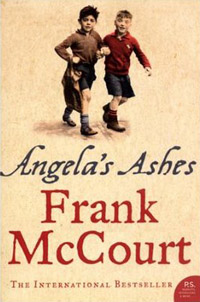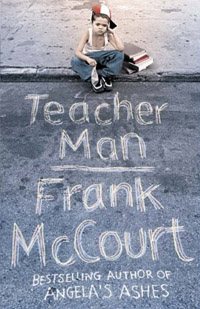“Teacher Man“, by Frank McCourt, page 224.
The class is commenting a poem (“My Papa’s Waltz“, by Theodore Roethke). A student called Ann speaks.

That’s one thing, Mr. McCourt, but we have to be careful. If you say something negative about anything, English teachers take it personally and get mad. My sister got in trouble with an English professor at Cornell over the way she interpreted one of Shakespeare’s sonnets. He said she was off the mark entirely, and she said a sonnet can be read a hundred different ways, otherwise why would you see a thousand Shakespeare criticism books on the library shelves, and he got pissed off and told her to see him in his office. This time he was nice to her and she backed off and said maybe he was right and went out to dinner with him in Ithaca and I got pissed off at her for giving in like that. Now we only say hello to each other.
Why don’t you write about that, Ann? It’s an unusual story, you and your sister not talking because of a Shakespeare sonnet.
I could, but I would have to get into the whole sonnet thing, what he said, what she said, and, since I hate getting into deeper meanings, and she’s not talking to me anyway, I don’t have the whole story.
David?
Make it up. There are three characters here, Ann and her sister and the professor, and there’s the sonnet that’s causing all the trouble. You could have a hell of a time with that sonnet. You could change the names, get away from the sonnet, say it’s a big fight about “My Papa’s Waltz“, and next thing is you have a story they want to turn into a movie.
Jonathan?
No offense to Ann but I can’t think of anything more boring than a story about a college student arguing with a professor over a sonnet. I mean, Jesus, excuse the language, this world is falling to pieces, people starving, et cetera, and these people have nothing else to do but argue over a poem. I’d never buy that story and I wouldn’t go to the movie if they let me take my whole family for free.
Who’s right?












